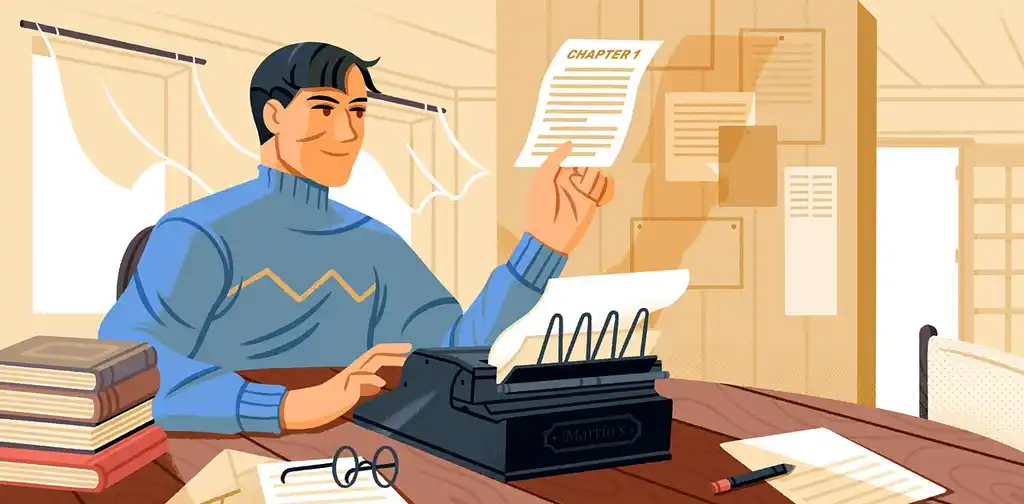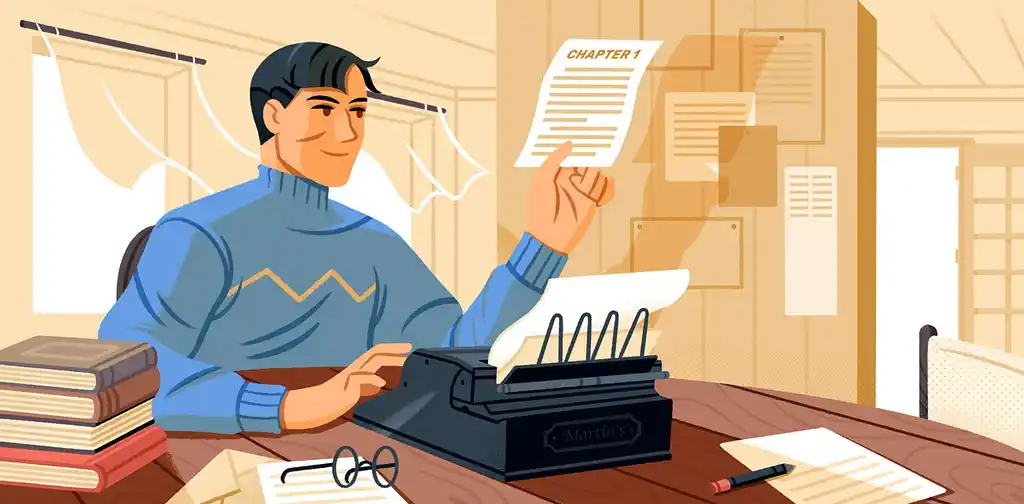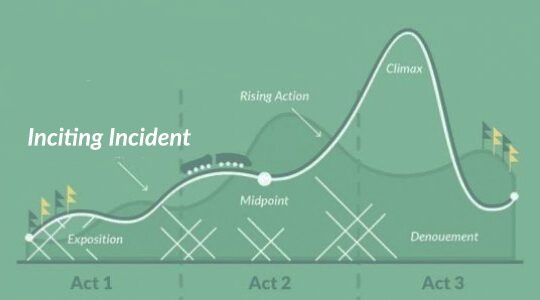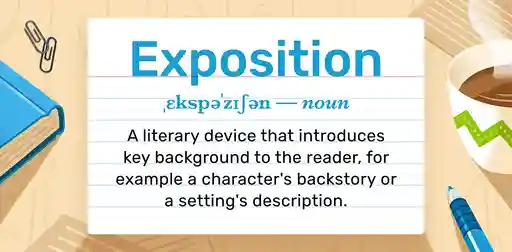Last updated on Sep 01, 2022
How to Start a Novel: 8 Steps to the Perfect Opening Scene
Tom Bromley
Author, editor, tutor, and bestselling ghostwriter. Tom Bromley is the head of learning at Reedsy, where he has created their acclaimed course, 'How to Write a Novel.'
View profile →With every novel he writes, Stephen King tries to invite the reader into the story with his opening. "Listen. Come in here. You want to know about this." Want to extend your readers an invitation they can't resist? Look no further! Here are 8 powerful steps to help you start a novel:
- 1. Identify the novel premise
- 2. Pick a point of view for your prose
- 3. Write a strong opening sentence
- 4. Set reader expectations in the first scene
- 5. Introduce major characters early in the writing process
- 6. Establish conflict-heavy stakes
- 7. Develop an inciting incident that will drive the plot
- 8. Edit what you’ve written of the book
1. Identify the novel premise
As King says, the best novel openings aren’t just beautiful sentences — they’re invitations into a world of the author’s creation. That means the beginning of a novel should set the tone for all the writing that follows, letting the reader know what to expect as they make their way deeper into the story.
Consider your novel's overall tone
Now, don’t worry if you’re the kind of writer who likes to figure things out as they go. We’re not suggesting you plan out your whole plot scene by scene: there’s still plenty of room for spontaneity here. You should, however, consider the overall tone of your story from the beginning, whether it’s as soft as spun sugar or as sharp as a blade.
Make sure you keep this tone in mind from the very start. An out-of-place opening, after all, is like a bloody knife on the cover of a wholesome romance: sure to have your readers blinking in confusion instead of eagerly turning the pages. To avoid this kind of tonal whiplash, you’ll need to have a sense of where your novel’s going before you craft its opening lines. This is especially important if you hope for this novel to be the first in a trilogy or series.

FREE COURSE
How to Write a Novel
Author and ghostwriter Tom Bromley will guide you from page 1 to the finish line.
2. Pick a point of view for your prose
With your novel’s overall mood and tone in mind, you’re ready to make one of the most important writing decisions for your book: its point of view. Will you opt for colorful, voice-driven first person like in Huckleberry Finn? Or adopt a bird’s-eye view of the story with a third person omniscient narrator, like in Pride and Prejudice?
Of course, these are only two options from a vast array of possibilities. If you’d like to learn more about all the possible POVs and see examples of each in action, check out our detailed guide here.
Determine the right POV for your genre
No matter what, the POV you adopt should serve the needs of your story. Consider what’s typical of your genre — that gives you some indication of which POVs complement the literary conventions you’re likely to play with. Young adult novels, for instance, often use first-person narration so readers can really get to know their quirky, relatable protagonists. Mysteries, however, lean on third person limited to build up suspense and keep readers in the dark.
Pro-tip 💡: Nervous about starting a book? Hire a writing coach to support you as you write. You can find the best coaches — ones who have worked with bestselling authors and beginners alike — on Reedsy below.
Hire a writing coach
Taryn A.
Available to hire
~Query enthusiast~ Plot puzzle solver & character demystifyer. I'm here to enhance YOUR voice & vision. 10+ years in trad pub.
Elissa W.
Available to hire
Award-winning middle grade and picture book author who taught creative writing at Johns Hopkins. American living in New Zealand.
Sorrel P.
Available to hire
Editor with 30 years' experience ☆ MA in Publishing ☆ Agented and published author ☆ Clients include PRH (inc Ladybird) and Harper Collins
3. Write a strong opening sentence
Now you’ve reached the hardest part of starting a novel — coming up with the actual opening line. Luckily, this is also where it gets really fun. After all, you get to do what you do best: write!
We’ve got a post on how to start a story that’s chock full of tips from editors and examples from the greats. But the truth is, there’s no one right way to craft an amazing opening line. You can startle the reader, like George Orwell...
It was a bright cold day in April, and the clocks were striking thirteen.
… or enter your story in a low-key way, like Charlotte Brontë.
There was no possibility of taking a walk that day.
The crucial thing is, whatever you come up with, it has to feel right at the beginning of your novel. And if you want some inspiration for your opening sentence, take a look at First Line Frenzy, where editor Rebecca Heyman critiques first lines submitted by writers like you. She also gives plenty of advice for starting your novel off right.
4. Set reader expectations in the first scene
How do you create a mood for your novel, and keep it going right from the beginning? It’s all about setting your reader’s expectations.
If you’re writing a high-octane spy thriller with a shootout in every other chapter, you’ll need to orient your readers to that fast-paced, action-packed world right away. A more contemplative beginning, where your gun-toting hero reflects on his abandoned Catholic faith while recreating his mother’s gingerbread recipe from memory, might not be the best match. By the same token, your thoughtful, dialogue-driven novel about the psychological pressures of middle age probably shouldn’t open with a car chase.

Again, you don’t have to have every plot point in place to write an opening that’s tonally consistent with the rest of your book. Think of yourself as a painter choosing the palette for your next canvas. You may not have the whole composition in your head just yet, but you know whether to reach for yellow pigment, or blue.
5. Introduce major characters early in the writing process
With your opening line in place, you’re ready to ground your story with a human element. That’s right — it’s time to bring some characters on-stage and let them move the story forward.
Go light on the backstory
Introducing characters right from the start helps you avoid one major novel-writing mistake: an overly descriptive, info-dumpy beginning. You may have seen these before. There’s the travelogue opening, which pans slowly over a landscape with nary a human figure in sight. There’s also the worldbuilder’s info-dump: the author piling on details upon details about their alien homeworld or fantasy realm. No matter how beautiful the description or how fascinating the tidbits, this sort of opening will make the reader's mind wander.

To avoid a stagnant, detail-clogged opening, introduce a key character — or a few — right away. They’ll act as lightning rods for the reader’s attention and their sympathy, getting them emotionally invested the way a sun-drenched meadow or a lecture on wizarding coinage never could.
Don't start with character description
A word of warning here: don’t replicate all the disadvantages of a scenic opening by starting off with a block of character description! To really hook your readers, make sure your characters come on-stage doing something reflective of their personality, not just gazing at their own reflection for the reader’s benefit.

FREE COURSE
How to Develop Characters
In 10 days, learn to develop complex characters readers will love.
Don't introduce too many characters all at once
One bad way to start a novel is opening without any characters. Another bad way? Introducing too many characters right from the get-go. Even if you’re writing a sprawling epic with a cast of hundreds, you want to be selective about the characters you introduce in your opening. Allow too many of them on-stage right away, and your reader’s attention will be split in too many directions. That makes it hard for them to get emotionally invested in any of your characters, or even remember their names!
6. Establish conflict-heavy stakes
Starting your novel with well-drawn characters makes it easy for readers to feel like there’s something at stake: these are the people who will hurt when it all goes wrong. And make no mistake — something should go wrong. No one wants to read a novel without any conflict.
Of course, the struggle at the heart of your story doesn’t have to be life-and-death: not every book needs to open on a smoking gun or an unidentified corpse. But a sense of tension should be present from the very beginning of your novel, even if you’re writing the quietest literary fiction.
Show the reader what your character wants
In the end, establishing the stakes comes down to showing what your character wants. Now, that want can be grand, or it can be deeply personal, anything from overthrowing an oppressing regime to getting into college. The key is, it has to matter deeply to the character.
Of course, what your character wants can't be too easy to attain. To give your novel the right about of tension, pursuing their goal needs to put something at risk, whether that's their life or their peace of mind.

FREE RESOURCE
Get our Book Development Template
Use this template to go from a vague idea to a solid plan for a first draft.
7. Develop an inciting incident that will drive the plot
Once you’ve established what’s at stake in your narrative, you have to bring the tension to the forefront with a compelling inciting incident. If you’d like to learn more about this all-important plot element, we’ve got a post that goes into the ins and outs of how to write a great one. But in a nutshell, your inciting incident is the event that sets your plot in motion.
Get to your inciting incident early
The inciting incident triggers the main action in your story, but it doesn’t have to be the first thing to happen. Still, if you want to hook your readers from the get-go, place it early in your novel — don’t make them wade through forty pages of backstory first.

Make sure it strikes the right tone
Like everything else about your novel opening, your inciting incident should be engaging while matching the overall energy of your plot. If you're writing a quieter story, your inciting incident can be far subtler than a car chase.
Say you're writing about a violinist who applies to music school against his parent's wishes. Your inciting incident might be as simple as an acceptance letter from Juilliard showing up in the mail. A big envelope arriving by (non-owl) post may not be as much of a bombshell as Harry Potter learning he’s a wizard. But it gets the story moving without feeling tonally out of place.
8. Edit what you’ve written of the book
Once you’ve written the beginning of your novel — inciting incident and all — you’re not stuck with it forever. In fact, you should revisit it as your story develops. To make sure your opening scene still makes sense in the context of your book as a whole, work your way through this checklist when it's time to revise:
✅ Does the tone of your opening still fit?
The premise — even the genre — of your novel can change over the course of the writing process. Make sure your opening isn't an artifact of an old draft. If you started out with an earnest romance, only to see it morph into something more tongue-in-cheek, your opening scene should now have that satirical bite.
✅ Are you giving the right background info?
Like your genre, your setting can evolve as you write — you might end up refining some worldbuilding that was murkier at first. Make sure all of these changes have been incorporated into your opening. Do the details introduced still make sense, given how the world of your story looks now?
✅ Is your characterization consistent?
Of course your characters will grow and change over the course of the plot. But there should be a thread of continuity that makes each character recognizable. Take look at everyone who appears in your opening scene. Are they portrayed in a way that's consistent with their behavior in the rest of the book?
Remember, revising the beginning of your novel is an ongoing process. And once you feel you’ve taken it as far as you're able to, you can always loop in a professional editor to polish it even further. The key is to keep tinkering with it until you've got an opening that just feels right. We can’t wait to see what you come up with.
Are you working on the perfect opening for your book? Make sure the chapters that follow are just as strong as our post on novel writing basics!










